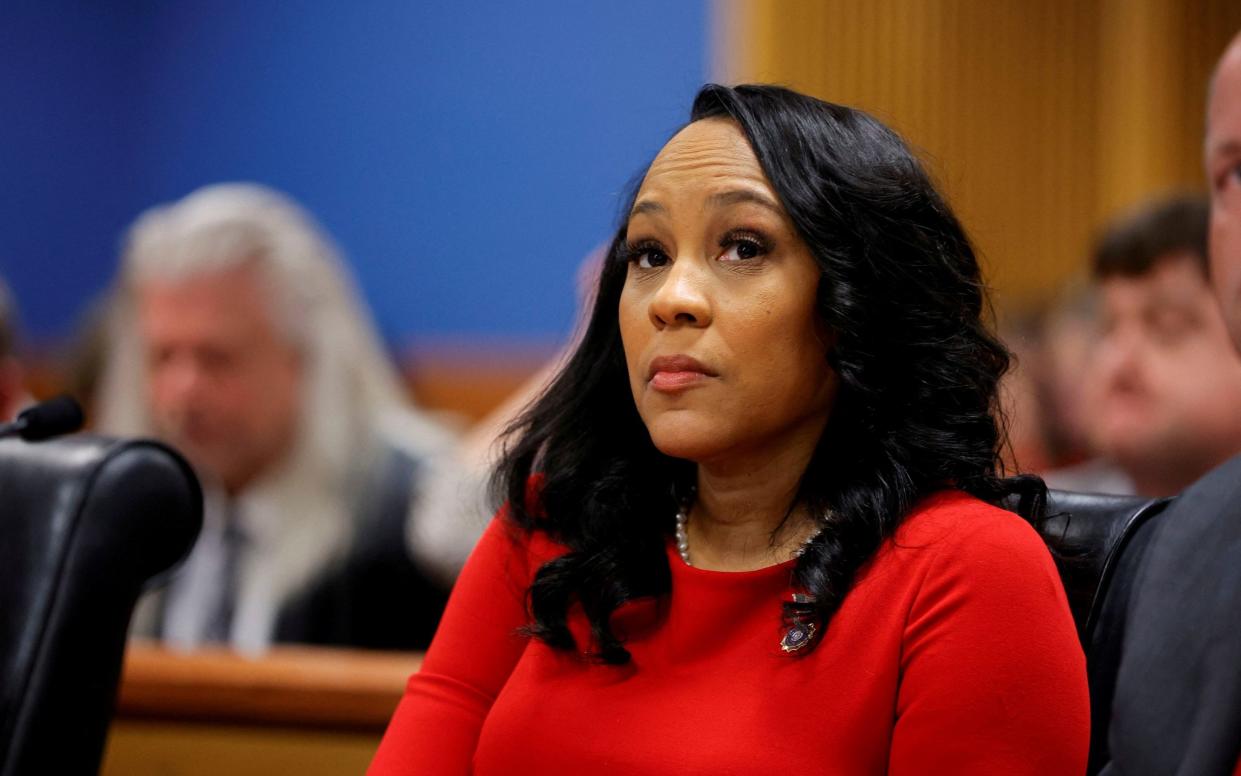The Georgia legal case against Donald Trump is falling apart

- Oops!Something went wrong.Please try again later.
- Oops!Something went wrong.Please try again later.
Last week, the judge overseeing the election-interference case against Donald Trump ruled that District Attorney Fani Willis could stay on the case she brought. While but one of many legal cases brought against the former president, this particular trail is notable for being held in Atlanta under Georgia state law – which means a reelected Trump could not pardon himself or anyone else.
To prosecute the case, Willis hired an outside attorney, Nathan Wade, as lead counsel. Because the case charges the defendants with collusion – it is being tried under the RICO laws – it is among the most complex any lawyer could bring. Oddly, the attorney Willis hired to bring it has zero experience trying any complex felonies, including RICO cases. He was a municipal judge, and then a private attorney who handled small accidents and injuries. So why would Willis choose him?
The co-defendants raised this question in a pre-trial hearing before Judge Scott McAfee, and presented considerable testimony, receipts, and other data questioning Willis’ truthfulness, financial integrity, and compliance with Georgia laws for public officials.
What the co-defendants had discovered was damning. Willis was in an “amorous relationship” with Wade and hired him after their entanglement began. He had been paid very generously with taxpayer money, and accompanied her on expensive trips. There was no evidence that the DA ever paid Wade for her share of the trips, as required by Georgia law, or that she had filed the required forms disclosing their relationship.
The defendants also raised a serious question about her influencing potential jurors by making a racially-charged speech about the case at an African-American church. Willis and Wade are black; the defendants are white. She told the congregation, in a televised speech, that she and Wade were being attacked because they are black.
For these reasons and more, the co-defendants asked Judge Scott McAfee to remove Willis and Wade from the case. The court hearing was televised and filled with that great triumvirate of American scandals: sex, money, and power.
Last week, Judge McAfee issued mixed rulings. Willis and her office could remain on the case, he said, but that Wade would have to go if she did. He resigned immediately. That was the headline news, featured on TV, newspapers, and podcasts. But it is not the end of the story.
Judge McAfee wrote that the prosecutors’ self-defense had the “odor of mendacity.” That’s fancy-talk for lying, a serious infraction if done during testimony under oath. Their statements will be examined by higher judicial authorities in Georgia and could jeopardise their law licenses. Willis will also hear that phrase repeated in her reelection efforts, where her troubles have elicited some competition.
Second, the judge threw out several key charges in the case, including the most damaging one against former President Trump. On a recorded phone call to Georgia election officials, then-President Trump had asked them to “find” over 11,000 votes, enough for him to win the state in 2020. Whether he was asking them to create those votes illegally was the crucial question.
But it turns out there is trouble with the recording of that call. Although it was recorded by a Georgia official, she was in Florida when she recorded it, and the law in that state, unlike Georgia, requires all parties to a conversation to consent to its recording. She never asked for that consent. In any event, that crucial charge against Trump and the co-conspirators was tossed out, along with several other important felony charges.
In fact, the judge found trouble with a lot of the counts. They detailed the relevant laws, he said, but they didn’t really connect the defendants with their violation. That was his chief reason for dismissing them. The civilian words for that are “really sloppy legal work.” Not a good look for the District Attorney or her office.
Third, the co-defendants are likely to appeal the judge’s ruling, which could further delay the start of the trial. That’s important for Trump’s election for two reasons. An ongoing trial would tie down the president during the heart of campaign season and a conviction would be extremely damaging politically.
Finally, RICO experts say the whole case is extremely weak, that Willis and her office have no experience trying such cases, and that they will have to master the materials that Nathan Wade dealt with before he resigned. At the very least, that will delay the trial, even if higher courts reject the co-defendants’ appeals. Moreover, Fani Willis’ conduct throughout the case has not only demonstrated bad judgment but a lack of legal sophistication. That’s good news for the defendants, bad news for the District Attorney.
Fani Willis has survived to fight on. But she resembles the beleaguered knight in Monty Python and the Holy Grail. The judge’s ruling lopped her arms and legs off. She keeps screaming, “It’s a mere flesh wound,” but her cries have the “odor of mendacity.”

